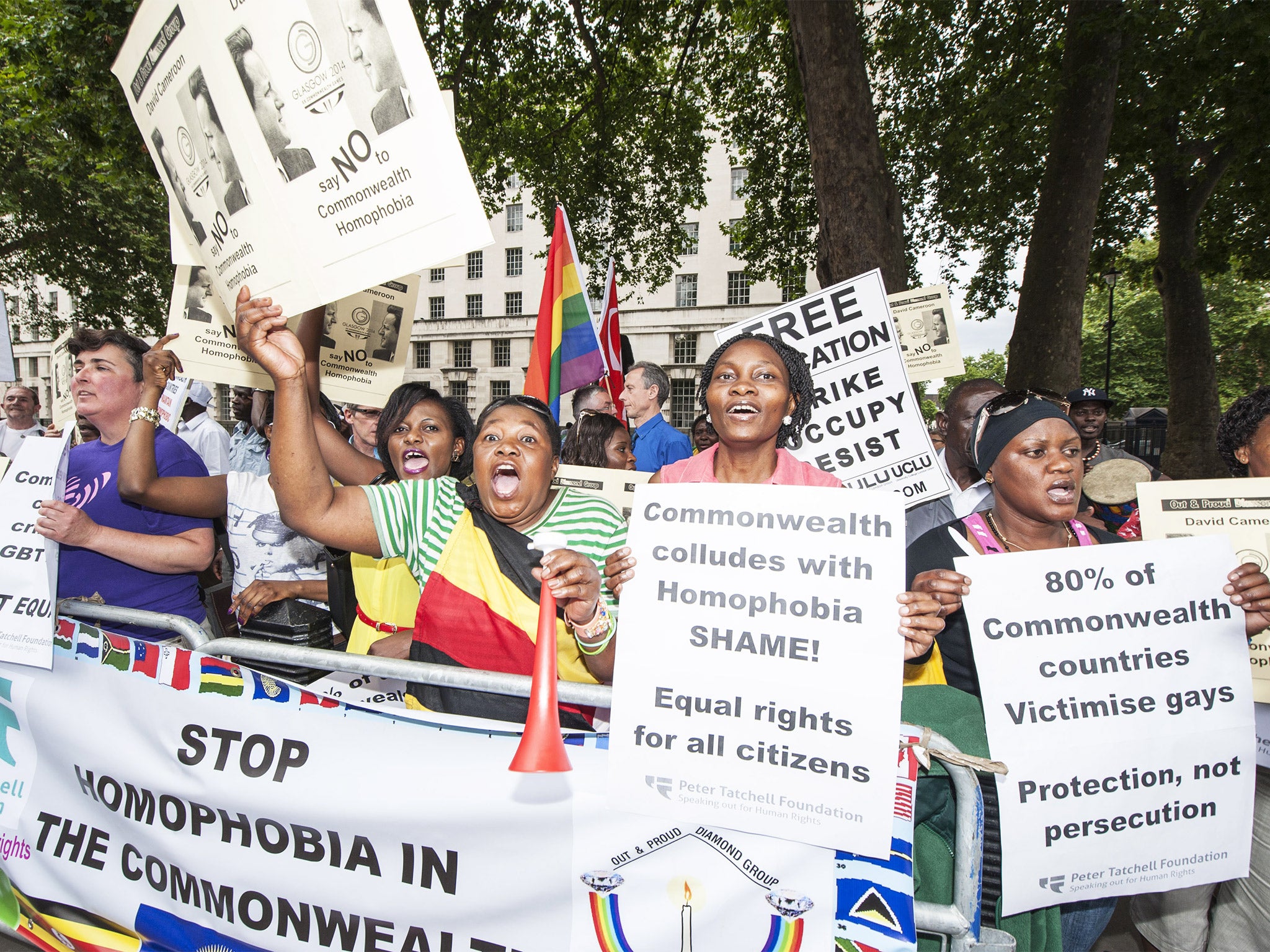David Cameron urged to use the Commonwealth Games in Glasgow to speak out against member states’ treatment of gay people
Gay rights activists led a protest outside 10 Downing Street this evening calling for a public statement

Your support helps us to tell the story
From reproductive rights to climate change to Big Tech, The Independent is on the ground when the story is developing. Whether it's investigating the financials of Elon Musk's pro-Trump PAC or producing our latest documentary, 'The A Word', which shines a light on the American women fighting for reproductive rights, we know how important it is to parse out the facts from the messaging.
At such a critical moment in US history, we need reporters on the ground. Your donation allows us to keep sending journalists to speak to both sides of the story.
The Independent is trusted by Americans across the entire political spectrum. And unlike many other quality news outlets, we choose not to lock Americans out of our reporting and analysis with paywalls. We believe quality journalism should be available to everyone, paid for by those who can afford it.
Your support makes all the difference.David Cameron was under increasing pressure today to speak out against homophobia ahead of the Commonwealth Games in Glasgow.
Of the 53 countries in the Commonwealth, 42 criminalise homosexuality and campaigners are demanding that the British Government uses the Games to tackle the issue.
African gay rights activists and the campaigner Peter Tatchell led a protest outside 10 Downing Street this evening calling for the Prime Minister to make a public statement against member states’ treatment of gay people.
Edwin Sesange, coordinator of the African LGBTI Out and Proud Diamond Group which organised the protest, said: “The UK government prides itself on the progress it has made for gay rights. David Cameron vowed to help defend LGBTI rights around the world. His promises have not, however, been backed with sufficient action. This is his chance to make amends.
“Far from moving towards equality, we have seen many Commonwealth countries witch-hunt their LGBTI citizens and even tougher anti-gay laws have been recently legislated in countries like Uganda, Brunei and Nigeria."
Mr Sesange said that since Britain imposed most of the existing anti-gay laws in Commonwealth countries during the colonial era, it should be “part of the solution” by challenging prejudice.
Mr Tatchell said: “We are appealing to Prime Minister David Cameron to speak out against homophobia and transphobia in the Commonwealth in the run-up to the Commonwealth Games, which start in Glasgow on 23 July.
"We also want him to express his public support for Article 7 of the Commonwealth Games Federation constitution, which prohibits any form of discrimination - including discrimination in athlete selection for the national teams.”
He added: “Given the extreme homophobia and transphobia in most Commonwealth countries, it is very unlikely that most national selection committees would allow a lesbian, gay, bisexual, transgender or inter-sex (LGBTI) athlete to compete at Glasgow.
"David Cameron can help by making clear that such discrimination is incompatible with Commonwealth Games values and rules.”
John Bosco Nyombi is a gay Ugandan man who sued the British Government after he was deported from Britain only to be persecuted by Ugandan police. He now has asylum in the UK and says David Cameron must seize the opportunity to take a stand.
“I’m in the UK and I’m safe now but other people in Uganda, or Zimbabwe or Nigeria are not. They are still suffering and the Prime Minister knows this. It shouldn’t be just the UK that has gay rights it should be all Commonwealth countries; they’re all under the queen.”
Sam Dick, director of campaigns at Stonewall, said: “Whilst the Commonwealth Games are a cause for celebration, we must not forget that for many gay people in the Commonwealth watching or listening to the Games will be the closest they come to equality. It’s vital that the Commonwealth does more to support lesbian, gay and bisexual people no matter where they may live.”
The gay sport inclusion charity, Leap Sports Scotland, will be running a pop-up cafe and LGBT support space at the Games called Pride House. Funded by the Scottish government it is the first time a state has paid to have a Pride space at a sporting event.
Hugh Torrance, chairman of the charity, said: “The Games provide an ideal platform for us to be engaging with these issues and David Cameron as head of this state is in a position to do that. If he made a statement about homophobia that would definitely highlight the issue.”
Uganda: In February, the President of Uganda, Yoweri Museveni, signed the Anti-Homosexuality Bill into law, blaming Western culture and saying he was “sick of homosexuals exhibiting themselves”.
Mauritania: Women can face prison for engaging in homosexual sex in Mauritania and Muslim men could be stoned to death by law.
Nigeria: Previously, having gay sex was illegal in Nigeria, but as of last March [2014], same-sex relationships are also illegal, and they could face up to 14 years in prison.
Sudan: Homosexual acts are punishable by death in Sudan, widely considered one of the most oppressive places for LGBTs.
Somalia: Laws suggest that gay citizens could face prison for homosexual relationships and sex, but some Islamic areas have imposed harsher punishments, such as the death penalty.
Yemen: men can be sentenced to death by stoning for homosexual intercourse, or they could face a year in prison, or whipping.
Qatar: Sharia law applies to Muslims, who can be put to death for extramarital sex, both homosexual and heterosexual.
Subscribe to Independent Premium to bookmark this article
Want to bookmark your favourite articles and stories to read or reference later? Start your Independent Premium subscription today.
Join our commenting forum
Join thought-provoking conversations, follow other Independent readers and see their replies
Comments